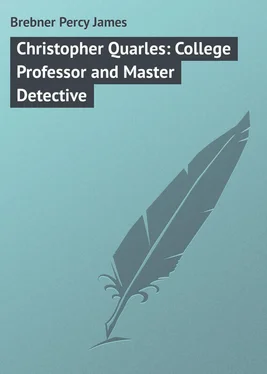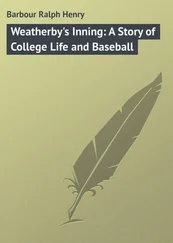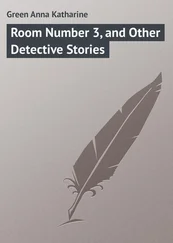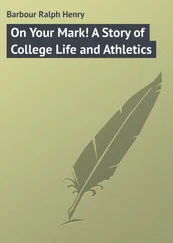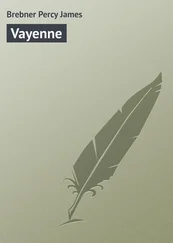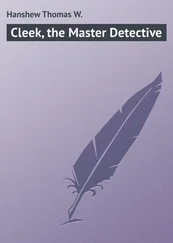Percy Brebner - Christopher Quarles - College Professor and Master Detective
Здесь есть возможность читать онлайн «Percy Brebner - Christopher Quarles - College Professor and Master Detective» — ознакомительный отрывок электронной книги совершенно бесплатно, а после прочтения отрывка купить полную версию. В некоторых случаях можно слушать аудио, скачать через торрент в формате fb2 и присутствует краткое содержание. Жанр: Классический детектив, foreign_detective, foreign_prose, на английском языке. Описание произведения, (предисловие) а так же отзывы посетителей доступны на портале библиотеки ЛибКат.
- Название:Christopher Quarles: College Professor and Master Detective
- Автор:
- Жанр:
- Год:неизвестен
- ISBN:нет данных
- Рейтинг книги:4 / 5. Голосов: 1
-
Избранное:Добавить в избранное
- Отзывы:
-
Ваша оценка:
- 80
- 1
- 2
- 3
- 4
- 5
Christopher Quarles: College Professor and Master Detective: краткое содержание, описание и аннотация
Предлагаем к чтению аннотацию, описание, краткое содержание или предисловие (зависит от того, что написал сам автор книги «Christopher Quarles: College Professor and Master Detective»). Если вы не нашли необходимую информацию о книге — напишите в комментариях, мы постараемся отыскать её.
Christopher Quarles: College Professor and Master Detective — читать онлайн ознакомительный отрывок
Ниже представлен текст книги, разбитый по страницам. Система сохранения места последней прочитанной страницы, позволяет с удобством читать онлайн бесплатно книгу «Christopher Quarles: College Professor and Master Detective», без необходимости каждый раз заново искать на чём Вы остановились. Поставьте закладку, и сможете в любой момент перейти на страницу, на которой закончили чтение.
Интервал:
Закладка:
The professor rose abruptly from his chair. Evidently he had no intention of answering questions, and he meant the interview to come to an end.
"Thank you," I said. "I shall take steps at once to find out if you are correct."
"For your own satisfaction, not mine," said Quarles; "I am certain. You asked how it was I came to Blenheim Square that morning. Chance! It is called that. I do not believe in chance. When I am impelled to do a thing, I do it because I recognize a directing will I am forced to obey. We live in a world girt with miracles, in an atmosphere of mystery which is beyond our comprehension. We find names for what we do not understand, psychic force, mind waves, telepathy, and the like, but they are only names and do not help us much. Keep an open mind, Mr. Wigan; you will be astonished what strange imaginings will enter it – imaginings which you will discover are real truths. An empty mind in an empty room, there you have the best receptacle for that great will which guides and governs all thought and action. I speak as a philosopher, and as an old man to a young one. Come to me if you like when you are in a difficulty, and I will help you if I am allowed to. Do you understand? Good-bye."
Subsequent inquiries made by Scotland Yard through the authorities in India established the fact that the sapphire eye of the image in Tibet had been stolen; that Mr. Ratcliffe was in Tibet at the time; and that not long after the tragedy in Blenheim Square the jewel was restored to its place with much rejoicing and religious enthusiasm.
I was not disposed to like Professor Quarles nor to believe in him altogether. I found it easy to see the charlatan in him, yet the fact remained that he had solved the problem.
Certainly he was interesting, and, besides, there was his granddaughter, Zena. If only for the sake of seeing her, I felt sure I should have occasion to consult Christopher Quarles again.
CHAPTER II
THE IDENTITY OF THE FINAL VICTIM
I soon fell into the habit of going to see Professor Quarles. As an excuse I talked over cases with him, but he seldom volunteered an opinion, often was obviously uninterested. Truth to tell, I was not there for his opinion, but to see his granddaughter. A detective in love sounds something like an absurdity, but such was my case, and, since Zena's manner did not suggest that she was particularly interested in me, my love affair seemed rather a hopeless one.
My association with Christopher Quarles has, however, led to the solution of some strange mysteries, and, since my own achievements are sufficiently well known, I may confine myself to those cases which, single-handed, I should have failed to solve. I know that in many of them I was credited with having unraveled the mystery, but this was only because Professor Quarles persisted in remaining in the background. If I did the spade work, the deductions were his.
They were all cases with peculiar features in them, and it was never as a detective that Quarles approached them. He was often as astonished at my acumen in following a clew as I was at his marvelous theories, which seemed so absurd to begin with yet proved correct in the end.
Perhaps his curious power was never more noticeable than in the case of the Withan murder.
A farmer returning from Medworth, the neighboring market town, one night in January, was within a quarter of a mile of Withan village when his horse suddenly shied and turned into the ditch.
During the afternoon there had been a fall of snow, sufficient to cover the ground to a depth of an inch or so, and in places it had drifted to a depth of two feet or more. By evening the clouds had gone, the moon sailed in a clear sky, and, looking round to find the cause of his horse's unusual behavior, the farmer saw a man lying on a heap of snow under the opposite hedge.
He was dead – more, he was headless.
It was not until some days later that the case came into my hands, and in the interval the local authorities had not been idle. It was noted that the man was poorly dressed, that his hands proved he was used to manual labor, but there was no mark either on his body or on his clothing, nor any papers in his pockets to lead to his identification. So far as could be ascertained, nobody was missing in Withan or Medworth. It seemed probable that the murderer had come upon his victim secretly, that the foul deed had been committed with horrible expedition, otherwise the victim, although not a strong man, would have made some struggle for his life, and apparently no struggle had taken place.
Footprints, nearly obliterated, were traceable to a wood on the opposite side of the road, but no one seemed to have left the wood in any direction. From this fact it was argued that the murder had been committed early in the afternoon, soon after the storm began, and that snow had hidden the murderer's tracks from the wood. That snow had drifted on to the dead body seemed to establish this theory.
Why had the murderer taken the head with him? There were many fantastic answers to the question. Some of the country folk, easily superstitious, suggested that it must be the work of the devil, others put it down to an escaped lunatic, while others again thought it might be the work of some doctor who wanted to study the brain.
The authorities believed that it had been removed to prevent identification, and would be found buried in the wood. It was not found, however, and the countryside was in a state bordering on panic.
For a few days the Withan murder seemed unique in atrocities, and then came a communication from the French police. Some two years ago an almost identical murder had been committed outside a village in Normandy. In this case also the head was missing, and nothing had been found upon the body to identify the victim. He was well dressed, and a man who would be likely to carry papers with him, but nothing was found, and the murder had remained a mystery.
These were the points known and conjectured when the case came into my hands, and my investigations added little to them.
One point, however, impressed me. I felt convinced that the man's clothes, which were shown to me, had not been made in England. They were poor, worn almost threadbare, but they had once been fairly good, and the cut was not English. That it was French I could not possibly affirm, but it might be, and so I fashioned a fragile link with the Normandy crime.
On this occasion I went to Quarles with the object of interesting him in the Withan case, and he forestalled me by beginning to talk about it the moment I entered the room.
Here I may mention a fact which I had not discovered at first. Whenever he was interested in a case I was always taken into his empty room; at other times we were in the dining-room or the drawing-room. It was the empty room on this occasion, and Zena remained with us.
I went carefully through the case point by point, and he made no comment until I had finished.
"The foreign cut of the clothes may be of importance," he said. "I am not sure. Is this wood you mention of any great extent?"
"No, it runs beside the road for two or three hundred yards."
"Toward Withan?"
"No; it was near the Withan end of it that the dead man was found."
"Any traces that the head was carried to the wood?"
"The local authorities say, 'Yes,' and not a trace afterward. The ground in the wood was searched at the time, and I have been over it carefully since. Through one part of the wood there runs a ditch, which is continued as a division between two fields which form part of the farm land behind the wood. By walking along this the murderer might have left the wood without leaving tracks behind him."
"A good point, Wigan. And where would that ditch lead him?"
"Eventually to the high road, which runs almost at right angles to the Withan road."
Читать дальшеИнтервал:
Закладка:
Похожие книги на «Christopher Quarles: College Professor and Master Detective»
Представляем Вашему вниманию похожие книги на «Christopher Quarles: College Professor and Master Detective» списком для выбора. Мы отобрали схожую по названию и смыслу литературу в надежде предоставить читателям больше вариантов отыскать новые, интересные, ещё непрочитанные произведения.
Обсуждение, отзывы о книге «Christopher Quarles: College Professor and Master Detective» и просто собственные мнения читателей. Оставьте ваши комментарии, напишите, что Вы думаете о произведении, его смысле или главных героях. Укажите что конкретно понравилось, а что нет, и почему Вы так считаете.
